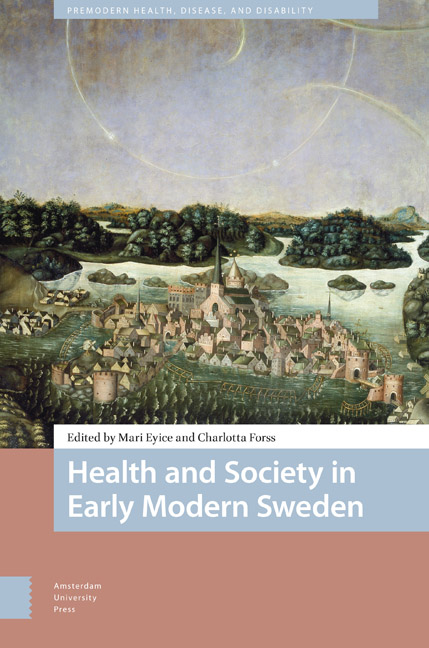Book contents
- Frontmatter
- Contents
- List of Tables and Figures
- Acknowledgements
- 1 Meanings of Health in Early Modern Sweden
- 2 Illness as Incapacity to Work in Early Modern Sweden
- 3 The Body in the Bathhouse: Health and Bathing in Early Modern Sweden
- 4 ‘Somewhat Heated, Quick and Lively’ : Humoral Explanations of the Learning Difficulties of Charles XI of Sweden (1655–1697)
- 5 Health in Body and Soul in a Female Birgittine Convent 1516–1522
- 6 Curing Madness and Mental Disturbances : Religious Healing Activities in Early Modern Swedish Local Communities
- 7 Not Quacks but Close : Reappraising the Role of Physicians on the Eighteenth-Century Medical Market
- 8 Gender, Health, and Hair in Sweden, 1740–1840
- 9 Gender Norms and Early Modern Healthcare : Barber-Surgeons in Sweden c. 1600–1900
- Epilogue : Epistemologies of Body and Soul: Considering the Early Modern and (Late) Modern History of Health
- Index
2 - Illness as Incapacity to Work in Early Modern Sweden
Published online by Cambridge University Press: 16 April 2024
- Frontmatter
- Contents
- List of Tables and Figures
- Acknowledgements
- 1 Meanings of Health in Early Modern Sweden
- 2 Illness as Incapacity to Work in Early Modern Sweden
- 3 The Body in the Bathhouse: Health and Bathing in Early Modern Sweden
- 4 ‘Somewhat Heated, Quick and Lively’ : Humoral Explanations of the Learning Difficulties of Charles XI of Sweden (1655–1697)
- 5 Health in Body and Soul in a Female Birgittine Convent 1516–1522
- 6 Curing Madness and Mental Disturbances : Religious Healing Activities in Early Modern Swedish Local Communities
- 7 Not Quacks but Close : Reappraising the Role of Physicians on the Eighteenth-Century Medical Market
- 8 Gender, Health, and Hair in Sweden, 1740–1840
- 9 Gender Norms and Early Modern Healthcare : Barber-Surgeons in Sweden c. 1600–1900
- Epilogue : Epistemologies of Body and Soul: Considering the Early Modern and (Late) Modern History of Health
- Index
Summary
Abstract
The chapter analyses the meanings of ‘illness’ and ‘incapacity’ in early modern Swedish criminal investigations. In so doing, it challenges the prevalence of humoral theory in previous scholarship regarding popular notions of sickness and health. The chapter shows that people described themselves as ill and ‘incapacitated’ as a way of emphasising that their bodies were of less use to them for purposes of work. Corresponding to illness and incapacity were specific measures of abledness, in relation to which a person's varied ability to perform normal routines were assessed. It is thus argued that notions of health were based on people's reliance upon their bodies for purposes of subsistence, and, in conclusion, that people embraced a functional understanding of both ill and good health.
Keywords: early modern household, body, illness, disability, capacity to work
Introduction
At a 1692 court session in Snevringe, a small village outside of the town Vasteras, farmer Anders Larsson sued farmhand Olof Nilsson for having breached their employment contract. According to their agreement, Olof was supposed to work for Anders for about four months. However, Olof had only fulfilled his duties for six weeks. In his defense, Olof explained that he had fallen ill and thus had been too weak to perform the tasks expected of him. Anders reproached Olof and stated that he had not demanded Olof to exceed his abilities when working for him. Anders added that Olof, despite his current, frail condition, should at least have been able to thresh grain. The court verdict was that Olof should either return his salary in lieu of unfulfilled weeks of work to Anders, or return to work for him for the remaining nine weeks, as stipulated in the original agreement.
The case referred to above offers insights into a typical breach of contract negotiations between a farmer and a farmhand in seventeenth-century Sweden, such as it might unfold in a case of a breach of contract. But it also informs us about how ordinary people in early modern Sweden could use concepts of illness, impairment, and bodily ability in everyday contexts, and more importantly, what meanings were given to these concepts.
- Type
- Chapter
- Information
- Health and Society in Early Modern Sweden , pp. 37 - 56Publisher: Amsterdam University PressPrint publication year: 2024

